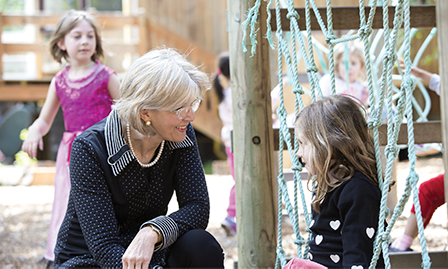Back to VCAA Bulletin No. 45 - February 2019
Conceptual playworlds: Intentional teaching in action
The Conceptual Playworlds project, currently underway at Monash University, encourages early childhood educators to create narratives and settings for children to explore science, engineering and technology (SET). The project encompasses integrated teaching and learning approaches, one of the practice principles of the Victorian Early Years Learning and Development Framework (VEYLDF). The practice principle involves attunement to children, active engagement by and with children, sustained shared thinking and conversations, and intentional teaching.
The project is led by Professor Marilyn Fleer, recently awarded the prestigious Kathleen Fitzpatrick Australian Laureate Fellowship for her research into early childhood education. This is the first time the fellowship has been awarded for research in early childhood education. The five-year study will investigate how children form SET concepts in both educational and home environments, leading to the development of an Australian evidence-based model of teaching SET in play settings.
The project has launched the Conceptual Playworld app, which guides early childhood educators of four- and five-year-old children through a series of videos explaining how to create a conceptual playworld. The steps include choosing a story, designing spaces, planning play scenarios and establishing educator roles. The app is currently available for free download on Apple devices and will be available for Android devices in May 2019, with examples of conceptual playworlds for two- and three-year-olds, and five- to eight-year-olds.

Marilyn Fleer engages children in a conceptual playworld
at Preshil Primary School, Kew.
Early childhood educators interested in participating in a longitudinal study of infants, toddlers and preschoolers in the second part of 2019 should contact Professor Fleer's research team at Monash University. There are also opportunities for four PhD students to participate in the program. Interested participants can contact Dr Sue March at
sue.march@monash.edu.
For further information about the project and Professor Fleer's research, visit the
Monash University website.
Do you need a copy of the VEYLDF or Transition to School Resource Kit?
The VEYLDF provides outcomes and practice principles to guide early childhood professionals working with children and their families. Complementing the VEYLDF, the Transition to School Resource Kit is designed for professionals working with children and families in the year before school and the first year of primary school.
The high-quality resources include a range of discipline-specific guidelines and practices to help early childhood professionals work with and support other professionals and families to achieve the best outcomes for each child.
Printed copies of the VEYLDF or the Transition to School Resource Kit can be
ordered from the VCAA website. Electronic copies can also be
downloaded from the VCAA website. Note that the resources are for professionals working with children from birth to eight years and are not intended for general distribution to families.